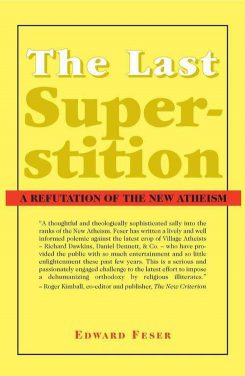The Last Superstition: Who Is This God Person, Anyway?
Chapter 3: The Existence of God
So when people say “God”, what sort of entity are they talking about?
Many secularists seem hell-bent (if you’ll pardon the expression) on pretending that religious people in general believe in a God so anthropomorphic that only a child or the most ignorant peasant could take the question of His existence seriously even for a moment. I know I’ve heard the stupid “Easter Bunny” comparison often enough to make me want to scream [p.87]
I’m afraid Feser needs to come down from the ivory tower more often. He’s making the argument that Daniel Fincke satirized at Camels With Hammers. If no (or only an insignificant minority of) religious people in general think that God is, basically, an old man who watches everyone, then who keeps buying Chick tracts and leaving them in public places? Who keeps handing me flyers with titles like “Heaven is real and hell is real”?
Feser prefers sneering over hard data, but there is data out there. This Gallup poll from June 2016, for example, tells us that 72% of Americans believe in angels, 71% in heaven, 64% in hell, and 615 in the devil. The Pew research Center’s 2015 Religious Landscape Survey also tells us that 31% of American adults think scripture is the word of God and should be taken literally. Gallup also tells us that around 40% of Americans think that “God created human beings pretty much in their present form at one time within the last 10,000 years or so”.
As I write this, Mother Teresa of Kolkata was canonized less than a week ago, something that required her to perform two miracles. In this case, two people were allegedly healed of their diseases (at least one while receiving medical care) and the Catholic church’s ruling that these are miracles means that yes, God somehow arranged for the natural course of nature to be suspended so that these people could be healed.
In fairness to Feser, though, I must point out that I wasn’t able to find any surveys on whether or not God has a beard.
But the point is that a lot of people do believe in God as a being who, if not man-shaped, certainly does many things that humans do, like watch over the ones he loves and intervene on their behalf. Feser can dismiss people who believe this as ignorant peasants if he likes, but he can’t claim that they’re an insignificant minority. And if this many people believe in “so anthropomorphic” a God, then Feser’s side has a lot of work to do, educating the people in the pews. And in the meantime, if he wants to say that there’s no man in the sky who’ll help you find a parking space if you pray to him, well, welcome to this side of the debate.
(Credit for the title goes to Douglas Adams.)

As a Catholic, I’m pretty sure Feser believes all or most of that too. It’s just the conception of God he quibbles over. Though again, I’d bet most lay people do not have the sophisticated view which he does, not being philosophers (whether or not they believe God is really a man in the sky). So all this seems just a bit beside the point on his part.
I don’t understand the distinction you’re making here. What’s the difference between believing a set of things about God, and having a conception of God?
I mean I’m sure he believes that aside from the “folk” conception of God many have.